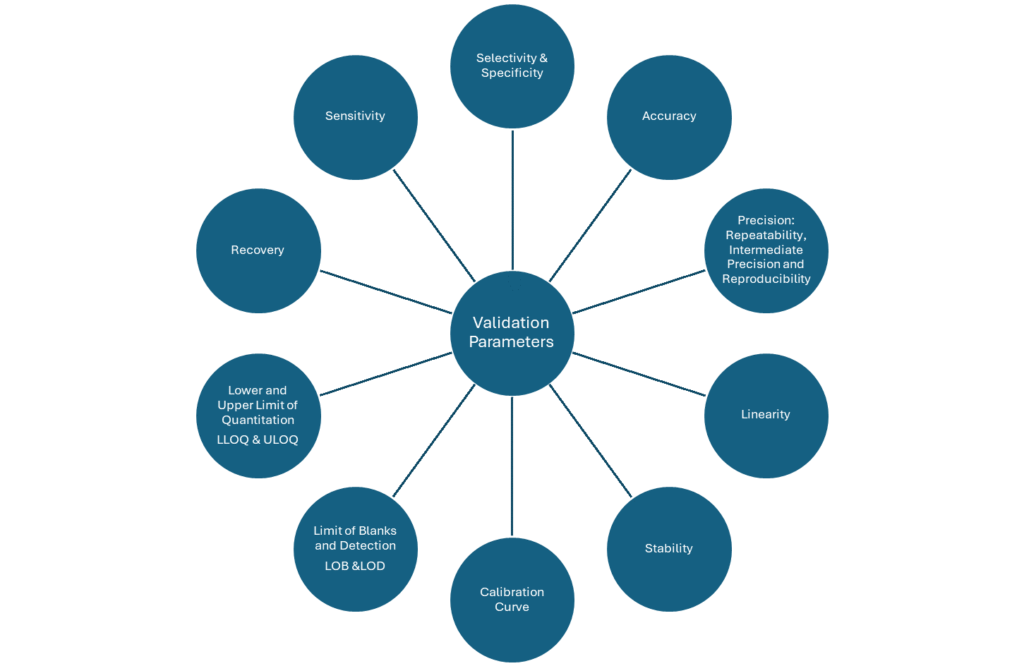Bioanalytical Method Validation is a critical process in pharmaceutical and biomedical research that ensures the analytical methods used to detect and quantify biological molecules, such as drugs, metabolites, or biomarkers, in biological samples like blood, plasma, or tissues are fit for purpose. This validation is essential not only for generating credible data but also for meeting stringent regulatory requirements set forth by agencies like the FDA (Food and Drug Administration) and European Medicines Agency (EMA) under Good Manufacturing Practices (GMP). The FDA’s guidance on bioanalytical method validation outlines necessary parameters—such as Limits of quantitation (LOQ), accuracy, precision, calibration curve, selectivity, sensitivity, reproducibility, and stability —that must be rigorously assessed to ensure that the analytical method consistently delivers reliable results.

Our company can help you validate your bioanalytical methods and life cycle management for submission to regulatory agencies, drawing on our extensive experience, expert knowledge, and professionalism. We provide detailed outputs with precise interpretation that meets all regulatory expectations, ensuring that your methods are robust, reproducible, and capable of withstanding scrutiny during regulatory reviews, ultimately supporting the safety and efficacy of your pharmaceutical products.
Since IDDI’s creation in 1991, more than 350 pharmaceutical and biotechnology companies, as well as academic cooperative groups and CROs worldwide, have relied successfully on our expert biostatistics services, statistical consulting, operational excellence, unbiased expertise, independent data quality assessments capabilities and regulatory-compliant procedures to optimize the value of their clinical trials.
In-depth experience in a range of therapeutic areas, paired with profound understanding of ICH GCP, regulatory requirements and ADaM analysis datasets, ensures quality throughout all stages of drug development.
Our strong team of biostatisticians and statistical programmers produce high quality, reproducible, timely analysis and reporting of clinical trial results across all therapeutic areas. All of our statisticians and statistical programmers receive ongoing, intensive training inside and outside the company to deliver premium biostatistics and statistical programming services.

When providing biostatistical analysis, IDDI’s statisticians implement both standard and innovative statistical methods to provide results that are accurate, reliable, and reproducible, using techniques that are recommended by the regulatory agencies.
Our expert biostatisticians offer flexible and innovative solutions and are not afraid to challenge the status quo. As a biostatistics CRO with scientific roots and in-depth clinical and regulatory experience, our team understands the scientific issues, anticipates, and overcomes potential challenges specific to your clinical trial.
No matter the complexity of your clinical trial, we will tailor a solution to your clinical data analysis needs. We use innovative study designs and advanced biostatistical methodology to support clinical trials in any phase in any therapeutic area.
Discover IDDI’s statistical processes to support the clinical trial life cycle: Hover your mouse!
| DESIGN | Innovative trial design Design and writing of statistical section of the protocol |
| SET UP | CRF Review by Biostatistician to ensure the most efficient and correct data collection Creation of randomization lists and randomized kit lists Validation of randomization algorithm |
| CONDUCT | Statistical Analysis Plans DMC Charter Monthly randomization checks to ensure groups are well balanced and study drugs are properly allocated Creation of ADaM derived datasets DSUR analyses SAS programming and independent verification of tables, listings and figures Interim analyses Futility analyses DMC preparation and attendance |
| ANALYSIS | Final ADaM datasets and associated documentation (define.xml/ADRG) PK Analyses (NCA) Final tables, listings and figures Integrated summaries of safety and of efficacy (ISS, ISE) |
| REPORT AND PUBLICATIONS | Statistical appendices in accordance with ICH E3 guideline Statistical review of Clinical Study Report (CSR) Statistical inputs to publications Statistical sections of FDA/EMA submissions |
| OTHER ANALYSES & SUPPORT | Meta-analysis Validation of surrogate endpoints Exploratory Analyses Biomarker-IVD Validation Support with Regulatory Bodies |

Getting an accurate diagnosis can be one of the most impactful experiences that you can have.
Copyright © 2024 Almustat.com